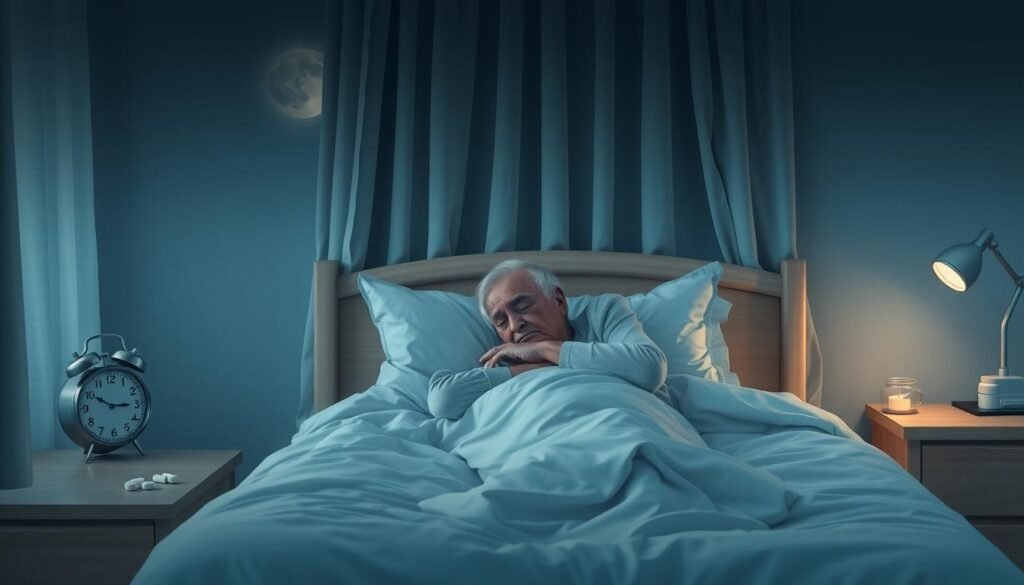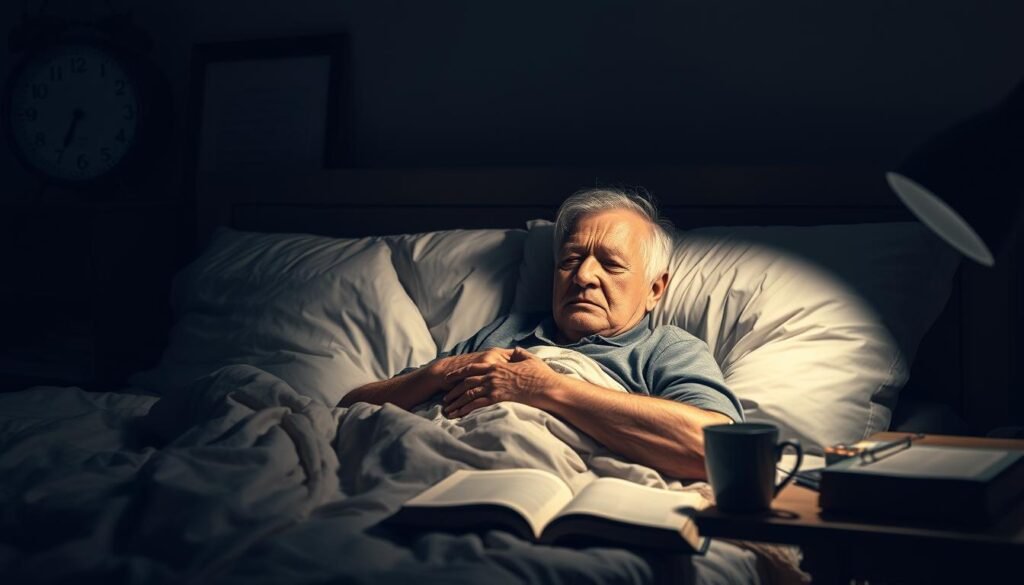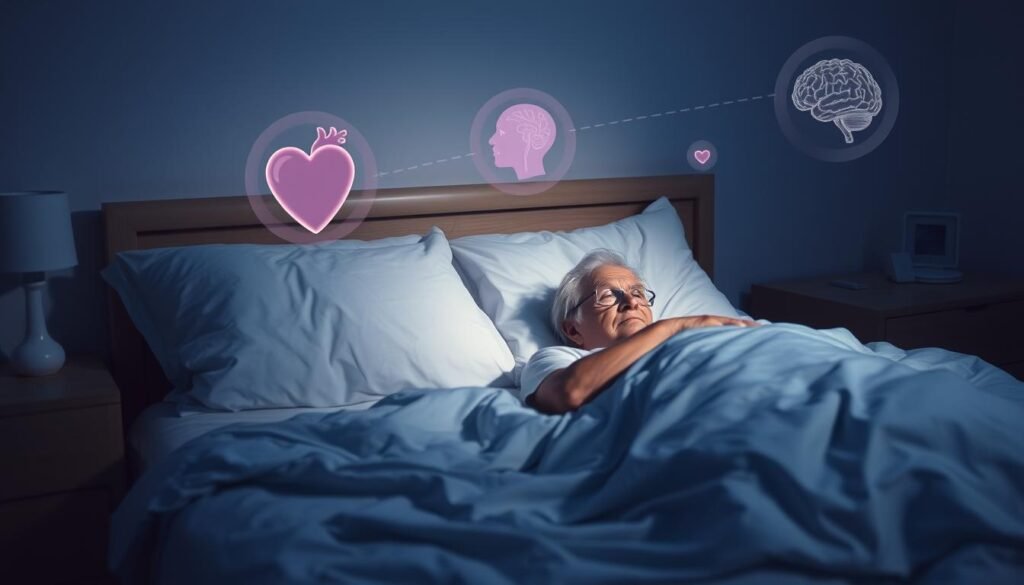Did you know that 30% to 48% of older adults have insomnia symptoms? This fact highlights a serious issue that affects many seniors, leading to health problems and lower life quality. Insomnia causes trouble sleeping and can seriously harm health and happiness. It’s important to know why many older adults have insomnia as society gets older.
This article will look at the many reasons behind elderly insomnia. We’ll explore how mind, body, surroundings, and daily habits affect their sleep. This will help us understand how aging and sleep problems are connected. And we’ll talk about ways to help and make things better.
Key Takeaways
- Insomnia symptoms affect 30% to 48% of older adults.
- Various psychological and physical factors contribute to elderly sleep issues.
- Environmental conditions play a crucial role in sleep quality for seniors.
- Lifestyle choices can alter sleep patterns, leading to sleep deprivation in seniors.
- Understanding insomnia in older adults is key to improving their overall health.
Understanding Insomnia
Insomnia is a tough problem, especially in older people. Many deal with different insomnia triggers that mess up their sleep. About half of all older adults have trouble sleeping. This shows why it’s key to get why sleep issues happen in the elderly.
Several things make insomnia more common. As we get older, we make less melatonin, and our sleep patterns change. Older people often have shallower sleep and wake up more. About 20% say they can’t fall asleep easily. About 30% wake up often during the night.
Insomnia does more than just tire you out. It affects how well you can do things day-to-day and your mental health. Not getting enough sleep can lead to serious health problems. These include depression, high blood pressure, and issues with thinking. Sleep disorders, like sleep apnea and Restless Legs Syndrome (RLS), add to the problem.
It’s important to understand all this so we can find ways to help. Knowing what causes sleep problems in older adults helps us make better plans for improving sleep.
| Factors Contributing to Insomnia | Impact on Sleep |
|---|---|
| Decreased melatonin production | Difficulty falling asleep |
| Frequent awakenings | Light sleep patterns |
| Restless Legs Syndrome | Disrupted sleep cycles |
| Health conditions | Increased anxiety and depression |
| Pain and discomfort | Difficulty staying asleep |
| Environmental factors | Inability to achieve restful sleep |
What is Insomnia?
Insomnia is a common sleep disorder. It makes falling asleep, staying asleep, or waking up too early difficult. Older people often experience dissatisfaction with their sleep quality. This condition includes symptoms like daytime tiredness, irritability, and problems focusing. Recognizing these signs is key in identifying insomnia in older adults.
Definition and Symptoms
Insomnia includes several symptoms, such as:
- Difficulty falling asleep
- Frequent awakenings during the night
- Waking up too early and not being able to return to sleep
- Feeling unrested after a night’s sleep
Chronic insomnia happens three times a week for over three months. Older adults lose about 27 minutes of sleep nightly per decade. This contributes to sleeping problems in this age group.
Types of Insomnia
There are two main types of insomnia:
- Acute Insomnia: This is short-term, lasting days to weeks. It’s often due to stress or major life changes.
- Chronic Insomnia: This lasts longer, with sleep troubles three nights a week for more than three months.
Advanced sleep-wake phase disorder is especially common in the elderly. They get tired early and wake up very early. As people age, they experience less deep and REM sleep. This harms overall sleep quality.
| Type of Insomnia | Duration | Common Symptoms | Possible Triggers |
|---|---|---|---|
| Acute Insomnia | Days to weeks | Difficulty falling asleep, Frequent awakenings | Stressful life events |
| Chronic Insomnia | 3 months or longer | Daytime fatigue, low energy | Health conditions, medications |
Understanding insomnia types helps in recognizing older adults’ struggles. It shows why it’s important to address insomnia risk factors in the elderly to improve their life quality.
Prevalence of Insomnia in Older Adults
Insomnia is a big problem for many older adults. About 30% to 48% of seniors find it hard to sleep. This issue makes it tough for them to stay asleep, affecting their life quality.
About half of the older adults face trouble sleeping. Specifically, 50% to 70% have issues staying asleep. Meanwhile, 35% to 60% struggle to fall asleep at all.
Each year, around 5% more older adults report insomnia symptoms. Studies reveal that nearly half find their sleep improves over time. Men tend to recover from insomnia faster than women.
As people get older, they sleep less—dropping from 10 to 14 hours in childhood to 5 to 7 hours in older age. This decrease in sleep leads to more periods of wakefulness, making a good night’s rest harder to achieve.
Understanding the causes of insomnia in seniors is crucial. It helps create better sleep aids and improves their living standards. For more info, check out this study on insomnia in older adults.
| Age Group | Prevalence of Insomnia Symptoms | Difficulty Maintaining Sleep |
|---|---|---|
| 18 to 64 years | 31% to 38% | Not specified |
| 65 years and older | 45% | 50% to 70% |
| Overall Elderly Population | 30% to 48% | up to 50% |
Causes of Insomnia in Older Adults
Insomnia is common in older adults for many reasons. These reasons include psychological, physical, environmental, and lifestyle factors. Each one affects how well older people sleep.
Psychological Factors
Anxiety and depression can mess up sleep. They are common in older folks and can lead to worse insomnia. Taking care of mental health is key to help with sleep issues in aging.
Physical Conditions
Health problems can make sleep hard. Arthritis, asthma, and acid reflux cause discomfort at night. It’s important for doctors to know all health issues to help with sleep problems.
Environmental Influences
A good sleeping environment is crucial. Light pollution, noise, and bad bedding can ruin sleep. Making a sleep-friendly space is essential for older adults.
Lifestyle Choices
Bad habits can make insomnia worse. Irregular sleep times, too much caffeine, and late-night screens are issues. Healthier habits can improve sleep and overall life for older adults.

Impact of Aging on Sleep Quality
Aging affects our sleep in many ways, causing problems for many older adults. About 40% to 70% of seniors struggle with chronic sleep issues. Unfortunately, half of these problems might not get the attention they need. A big issue is nocturia, where 80% of the elderly wake up to use the bathroom, disturbing their sleep.
The structure of our sleep changes as we age. Seniors often find themselves in lighter sleep stages and spend less time in deep and REM sleep. This leads to more awakenings, about 3 to 4 times each night. Contrary to what some think, older adults should still try to get at least seven hours of sleep.
About 20% of seniors deal with excessive sleepiness during the day. This could point to other health problems. Also, medicines play a role, as nearly 40% of those over 65 take five or more, which may increase the chance of insomnia. Not getting enough daylight—just an hour a day—and napping can also interfere with sleep at night.
Restless Legs Syndrome and Periodic Limb Movement Disorder are common among the elderly. Between 9% to 20% have RLS, and 4% to 11% suffer from PLMD. These conditions seriously affect their sleep quality. Understanding how aging influences sleep can help us improve the sleep of older adults.
Common Sleep Disorders in Older Adults
Many older adults struggle with sleep disorders, affecting their well-being. Learning about these issues can help manage them better. Common problems include sleep apnea and restless legs syndrome, which can make insomnia worse.
Sleep Apnea and Restless Legs Syndrome
Sleep apnea causes breathing to stop and start during sleep. This leads to waking up often. It makes people very sleepy during the day and more likely to have accidents. Restless legs syndrome makes the legs feel uncomfortable, causing the need to move them. This can interrupt sleep. Both of these conditions are known to reduce sleep quality in older adults.
Other Sleep Disorders
Apart from sleep apnea and RLS, there are other sleep disorders. These include periodic limb movement disorder and insomnia. Insomnia makes it hard for seniors to fall or stay asleep. Around 55% of older adults say they have insomnia.
Even healthy seniors might wake up many times at night. However, this doesn’t always mean there’s a serious problem. Still, getting 7 to 8 hours of sleep can be tough as people age.
| Sleep Disorder | Symptoms | Impacts |
|---|---|---|
| Sleep Apnea | Interrupted breathing, loud snoring, excessive daytime sleepiness | Increased risk of accidents, cognitive decline, poor control of chronic conditions |
| Restless Legs Syndrome | Uncomfortable leg sensations, urge to move | Disrupted sleep patterns, fatigue, increased irritability |
| Insomnia | Difficulties falling asleep or staying asleep | Higher rates of depression, decreased quality of life, cognitive impairments |
It’s key to recognize these sleep disorders for better sleep quality. Check out this resource for more on sleep issues in older adults.

Insomnia Triggers in Seniors
It’s important to know what causes sleep issues in seniors. A lot of times, chronic pain and health problems disrupt their sleep. These issues are key to finding ways to help them sleep better.
Chronic Pain and Health Conditions
Arthritis and bone issues cause chronic pain for many seniors. This pain makes finding a comfortable spot to sleep hard. It can wake them up a lot at night, ruining their sleep. Other problems, like diabetes and needing to go to the bathroom a lot, also mess with their sleep.
Medications and Substances
Some medications really affect seniors’ sleep. Medicines for seizures or Parkinson’s disease can make sleep worse. Also, cough syrups with alcohol or opium derivatives can mess up sleep. Taking sedatives or sleep aids for a long time can end up causing insomnia. This makes it hard to stop using them.
| Trigger Category | Specific Triggers | Effects on Sleep |
|---|---|---|
| Chronic Pain | Arthritis, bone disorders | Difficulty finding comfort; frequent awakenings |
| Health Conditions | Diabetes, urinary incontinence | Increased nighttime urination |
| Medications | Seizure medications, antihypertensives | Impaired sleep quality |
| Substances | Alcohol, opium derivatives | Disruptions in sleep patterns |
Health Implications of Sleep Deprivation in Seniors
Not getting enough sleep is a big problem for older adults. It can harm their mental and physical health. Short-term effects include feeling cranky and having a hard time focusing. But, not sleeping enough over time can lead to serious health problems. Older adults who don’t get enough sleep may face depression, anxiety, heart diseases, and memory problems.
Mental Health Effects
Poor sleep can really affect an older adult’s mental health. Studies show that not sleeping well can double the chance of getting depression, especially if they’re already sick. Bad sleep can increase anxiety and mood disorder symptoms too. About half of older adults struggle with insomnia, making them more likely to get depressed. It’s important for them to look into treatments like Cognitive Behavioral Therapy-Insomnia (CBT-I) to sleep better and reduce mental health risks.
Physical Health Risks
Not sleeping enough can also pose big health risks for seniors’ bodies. Research says older adults who don’t sleep well are more likely to get chronic diseases. For example, sleeping too little can raise the risk of high blood pressure by 23% and heart disease by 48%. Not sleeping enough is also linked with a 9% higher chance of getting type 2 diabetes for every hour of sleep lost. Plus, bad sleep can cause falls, obesity, and other problems. This shows how crucial it is for seniors to find ways to get better sleep.

| Health Issue | Increased Risk (%) | Notes |
|---|---|---|
| Hypertension | 23 | Linked to short sleep duration |
| Cardiovascular Disease | 30 | Increased risk with combined short sleep and insomnia |
| Coronary Heart Disease | 48 | Significantly impacted by inadequate rest |
| Type 2 Diabetes | 9 | Per each hour of reduced sleep |
| Obesity | Varies | Increased likelihood due to sleep fragmentation |
Diagnosing Insomnia in Older Adults
Diagnosing insomnia in older adults requires a detailed look at their sleep habits. This includes checking medical histories and sleep diaries. It’s crucial because missing a symptom can cause further health issues. Healthcare providers aim to find what causes the insomnia. They develop plans focusing on both the mind and body.
Various tools help in diagnosing. Structured interviews and questionnaires are commonly used. They uncover risk factors like chronic illnesses, medication effects, and mental health issues. Depression and anxiety, for example, greatly affect sleep. So, it’s important to treat these issues when diagnosing insomnia.
Sleep studies, or polysomnography, are another tool. They track sleep stages and identify problems like sleep apnea or restless leg syndrome. Knowing how these conditions interact helps in choosing the right treatment.
Getting the diagnosis right is very important. If insomnia isn’t treated, it can lead to worse problems, like cognitive decline. By addressing medical, mental, and lifestyle factors, doctors can improve patients’ lives. This holistic approach is key to a correct diagnosis.
To learn more about what causes insomnia in older adults, check out this research article.
Treatment Options for Insomnia
Helping older adults with sleep problems involves many strategies. This can include medical help and natural ways to get better sleep. Studies show that about 30% of elderly people suffer from insomnia. This shows the big need for treatments that really work.
Medical Interventions
Cognitive Behavioral Therapy for Insomnia (CBT-I) is a top choice. It’s usually better than taking medicine for sleep. Doctors suggest not using sleeping pills for a long time. And if needed, use the smallest dose that works. Some FDA-approved medicines for insomnia are:
| Medication | Indication |
|---|---|
| Eszopiclone | Improves sleep onset and maintenance |
| Zolpidem | Effective for both sleep-onset and sleep maintenance, with sublingual options for middle-of-the-night awakenings |
| Suvorexant | Enhances sleep maintenance |
| Low-dose Doxepin | Also indicated for sleep maintenance |
| Ramelteon | Effective for sleep-onset insomnia |
| Benzodiazepines | Generally advised against for routine use |
Over half of elderly Americans struggle with chronic insomnia. It costs a lot to take care of. Around 40% of older adults use over-the-counter sleep aids. Yet, these can make them feel tired during the day, which is risky.
Naturally Approaches to Enhance Sleep
Natural ways also help improve sleep. Exercising regularly and relaxation methods like meditation are key. Being active for 30 minutes on most days helps a lot. Other helpful strategies include:
- Light therapy to adjust internal body clocks
- Behavioral therapies to address underlying stress or medical conditions
- Sleep hygiene practices, such as maintaining a consistent sleep schedule
- Dietary adjustments, including the use of supplements like melatonin and valerian
Improving sleep for older adults involves handling insomnia risks well. Those with sleep problems should try a mix of methods for the best sleep and health.
Conclusion
Figuring out why older adults have insomnia is key to helping them sleep better. It’s not just one thing causing trouble. Psychological, physical, environmental, and lifestyle factors all play a part. This problem is serious. It’s not just about being tired. Poor sleep affects health, happiness, and the cost of care for older people.
Studies show there are many ways to treat insomnia. Cognitive behavioral therapy (CBT-I) is often the best first step. But, we need a well-rounded plan. This means using treatments like CBT-I and changing daily habits. By focusing on what causes insomnia, we can help older adults not just sleep better. But also feel better and do more each day.
So, solving sleep problems in older adults is crucial. It makes growing older healthier and more enjoyable. We know more about insomnia now than ever. If we commit to improving sleep, we can lessen its negative effects. Doing so will make a big difference in the lives of seniors.
Learn more about insomnia management.